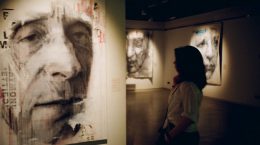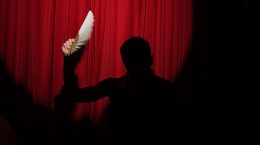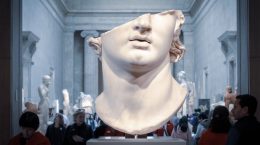During the 27 years of Lukashenka’s rule, our culture has changed a lot. A pompous “Slavyanski Bazar”, which was held even during the coronavirus pandemic, increased attention to “Dazhynki” (which have nothing to do with the old squad), carte blanche to those who support state policy. And behind the scenes of the state television – the long-standing repression of writers, musicians and actors who left the country, the closure of theatres, bookstores, objectionable to Lukashenka. To the culture week in “Our House”, we prepared the material about Belarusian after the 27-year presidency of the usurper.
Forbidden music
Rotations on radio, television, and performances at major venues in Belarus are available only to a select few – those who support Lukashenka. And even at the same time, there are not many fans of such artists. For comparison, only 3.5 thousand people follow the Instagram of Alyona Lanskaya (who has the title of Honored Artist of Belarus). And the opposition rock band Nizkiz has 21 thousand subscribers. Tickets for concerts of singers supporting Lukashenka are distributed to enterprises – state employees have to attend them under the threat of losing their bonuses or fear of dismissal. Indeed, people’s favourites are being hindered in every possible way: only this year the concerts of the groups “Daj Darogu!”, J:MORS and “Krama” were cancelled, and the quartermaster of the group “Razbitae Sertsa Patsana” was dispersed by the security forces.
Until 2007, there was an unspoken ban on the music of the groups “Krama”, “N. R. M”, “Palace”, “Neuro Dubel” in Belarus. To remove it, the musicians even visited the Presidential Administration to meet with the deputy for ideology Oleg Proleskovsky. The musicians asked Proleskovsky about the “black lists of culture activists” with people who don’t support Lukashenka. The deputy head of ideology acknowledged the existence of such lists and promised that an unspoken ban on organizing concerts would be lifted from rockers. And in return, he asked not to visit opposition rallies anymore.
 However, in 2010, authorities banned the music of rock artist Lyavon Volsky, who did not support Lukashenka in the 2010 elections. He even wrote several songs dedicated to the events of December 2010. Since then, he has been forced to perform outside of Belarus. The first concert of Lavon Volsky in his native country for many years took place in 2017. However, now, after the 2020 elections, the musician is also unlikely to perform in Belarus.
However, in 2010, authorities banned the music of rock artist Lyavon Volsky, who did not support Lukashenka in the 2010 elections. He even wrote several songs dedicated to the events of December 2010. Since then, he has been forced to perform outside of Belarus. The first concert of Lavon Volsky in his native country for many years took place in 2017. However, now, after the 2020 elections, the musician is also unlikely to perform in Belarus.
 In 2011, the Belarusian group “Lyapis Trubetskoy” was banned in the country. In March of that year, the group leader, Sergei Mikhalok, was refused to hold concerts in Gomel and Mogilev. In April, authorities cancelled performances in Minsk, Molodechno, Soligorsk and Zhlobin. Earlier, the collective did not recognize the results of the 2010 elections. Mikhalok signed an appeal to Lukashenka to release the oppositionists detained after the speeches that swept through Minsk on the day of the presidential elections. In October 2011, a criminal case was opened against Sergei Mikhalk for “insulting the president”. The band’s songs were banned from being played on the radio. In 2014, the song “Voiny Sveta” became the anthem of the Ukrainian Maidan. After that, the group broke up, and Mikhalok became the leader of the Brutto collective. He said that the group’s enemies are “the Kremlin, empires, tyrants, Lukashenko and Putin.” However, the band still performed in Belarus in 2016.
In 2011, the Belarusian group “Lyapis Trubetskoy” was banned in the country. In March of that year, the group leader, Sergei Mikhalok, was refused to hold concerts in Gomel and Mogilev. In April, authorities cancelled performances in Minsk, Molodechno, Soligorsk and Zhlobin. Earlier, the collective did not recognize the results of the 2010 elections. Mikhalok signed an appeal to Lukashenka to release the oppositionists detained after the speeches that swept through Minsk on the day of the presidential elections. In October 2011, a criminal case was opened against Sergei Mikhalk for “insulting the president”. The band’s songs were banned from being played on the radio. In 2014, the song “Voiny Sveta” became the anthem of the Ukrainian Maidan. After that, the group broke up, and Mikhalok became the leader of the Brutto collective. He said that the group’s enemies are “the Kremlin, empires, tyrants, Lukashenko and Putin.” However, the band still performed in Belarus in 2016.
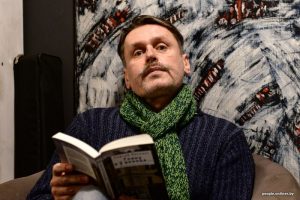 In 2011, the musician Dmitry Wojtyushkevich was also on the black list of cultural figures. In the 2010 elections, he also did not support Lukashenko, recognizing Vladimir Nyaklyaev as the leader. Until 2011, Dmitry gathered full halls at solo concerts in Minsk, performed in the Zhinovich Orchestra at the Philharmonic. Dmitry’s songs often sounded on the radio. Dmitry did not leave Belarus, but his concerts were held underground, on private estates. In 2014, he was able to legally perform at a concert of the Pesnyary group supporting Lukashenka. The Commission for the Prevention of Propaganda of Pornography, Violence and Cruelty gave him a tour certificate. Before, the commission analyzed all the lyrics of his songs. After, it was concluded that Wojtyushkevich “may be allowed for distribution on the territory of the Republic of Belarus.”
In 2011, the musician Dmitry Wojtyushkevich was also on the black list of cultural figures. In the 2010 elections, he also did not support Lukashenko, recognizing Vladimir Nyaklyaev as the leader. Until 2011, Dmitry gathered full halls at solo concerts in Minsk, performed in the Zhinovich Orchestra at the Philharmonic. Dmitry’s songs often sounded on the radio. Dmitry did not leave Belarus, but his concerts were held underground, on private estates. In 2014, he was able to legally perform at a concert of the Pesnyary group supporting Lukashenka. The Commission for the Prevention of Propaganda of Pornography, Violence and Cruelty gave him a tour certificate. Before, the commission analyzed all the lyrics of his songs. After, it was concluded that Wojtyushkevich “may be allowed for distribution on the territory of the Republic of Belarus.”
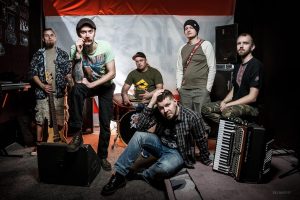 In April 2016, the rock band Dzieciuki faced performance difficulties. Rockers from Grodno got under an unspoken ban because their songs touch the theme of Belarusian history – from the side that state politics don’t support. Idelologists considered that the group has the purpose of carrying out propaganda of war or extremist activity. Only a year later, the musicians managed to perform in Vitebsk, but big concerts of rockers were held in Ukraine and Poland.
In April 2016, the rock band Dzieciuki faced performance difficulties. Rockers from Grodno got under an unspoken ban because their songs touch the theme of Belarusian history – from the side that state politics don’t support. Idelologists considered that the group has the purpose of carrying out propaganda of war or extremist activity. Only a year later, the musicians managed to perform in Vitebsk, but big concerts of rockers were held in Ukraine and Poland.
After the 2020 elections, new banned musicians and groups appeared in Belarus. The” list of traitors to Belarus”, published online in the summer of 2021, included representatives of Belarus at the Eurovision-2017 NAVIBAND, representatives of Belarus at the Eurovision-2020 VAL group, Concordia choir, Akute, J:MORS and Nizkiz collectives. Surprisingly, the same list includes many of those who were previously loyal to the regime: performers Iskui Abalyan, Inna Afanasyeva, Sasha Nemo, Alexey Khlestov, Larisa Gribaleva, Valery Daineko, representatives of Belarus at the Junior Eurovision Song Contest Olga Satsyuk, Ksenia Sitnik and Alexey Zhigalkovich and many others.
Classical musicians and opera singers were also banned. In 2020, Margarita Levchuk publicly refused to support Lukashenka, although, in the winter of 2020, she attended a closed event with his encouragement. After the singer participated in the duo “Krasnaya Zelen”, a criminal case was opened against her for outraging the national flag (Article 370 of the Criminal Code). Regina Sarkisova, Alla Dzhigan, Alexandra Potemina, Andrey Galanov were dismissed from the National Academic Bolshoi Opera and Ballet Theater after the action on October 27, 2020, when the orchestra played the composition “Magutny Bozha” before the opera “The Tsar’s Bride”. Baritone Vladimir Petrov was dismissed on May 31, 2021. He also spoke out against the violence in August 2020.
No to the theatre!
There are 42 places of detention in Belarus, and there are only 29 theatres. Despite this, the state believes that everything is fine in this area – because Lukashenka himself admitted that he restored the Kupala Theater: “I thought: it can’t be that in the centre of Minsk, under the window of the Central Committee of the CPSU, then Shushkevich, Grib, there was a toilet, and the Yanka Kupala theatre turned into a toilet. I did everything to turn him into this candy, into a toy. It’s like such a beautiful outwardly children’s toy with a good internal filling — I dreamed so much. I controlled the personnel so that normal people came, the young people came.” Now numerous theatre forums and festivals are held in Belarus under the auspices of the state. But actors and playwrights emphasize that a lot is happening by order in Belarusian theatre.
“There is a feeling that it is necessary to stage in the Belarusian theatre. While in the Western European theatre, they want to stage. And this “must” kills the quality. I recently read an article that one of the theatres announced plans for the season – 10 premiere performances. It turns out that 1.5 months for the preparation of the performance? It is unrealistic if we are talking about a big stage as a kind of canvas,” actor Dmitry Bogoslavsky says.
Private theatres have been destroyed in Belarus – all of them are financed from the budget and transfer everything they earn to the state. Lukashenka also spoke about this with the actors of the Kupala Theater: “All the funds that you will receive will be your funds, your profit. I will tell you how it will be not from this year, but from 2022: what you will earn – extra-budgetary – we will give you so much from the budget.” It turns out that it doesn’t even make sense for the theatre to earn a lot – after all, the collective will receive only a part of this money.
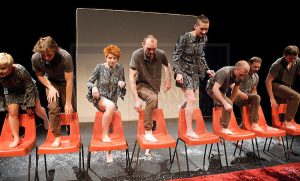
The only opposition theatre that has worked in Belarus is the Belarusian Free Theater. It was created in 2005 by political consultant Nikolai Khalezin and his wife, Natalia Kolyada. Vaclav Havel, Tom Stoppard, the British Embassy in Belarus supported them. An educational project for young Belarusians who have no theatrical experience has also appeared inside the theatre. The group toured abroad, became prize winners. But in Belarus, they worked underground and were even banned. In 2011, Nikolai Khalezin, Natalia Kolyada, directors and actors of the theatre, appeared on the black list of the Ministry of Culture.
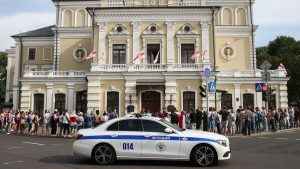 After the 2020 elections, dark times have come for the theatre workers of Belarus. On August 12, 2020, an appeal was issued by the employees of the Kupala Theater. They asked to stop violence on the streets. The next day, on August 13, the actors announced a strike, and on August 14, the subordinates were supported by General Director Pavel Latushko. On August 16, he came to the stele “Minsk – hero city” and said that the Minister of Internal Affairs should resign, and the state must thoroughly investigate all the crimes that happened in the first days of the protests. After that, the Ministry of Culture terminated the contract with Pavel Latushko. In response, many employees of the Kupala Theater wrote a letter of resignation, and a white-red-white flag appeared over the theatre building. It is noteworthy that the actors were not even allowed to take their things from the theatre. And they told state TV channels that the actors were fired for drunkenness and immoral behaviour.
After the 2020 elections, dark times have come for the theatre workers of Belarus. On August 12, 2020, an appeal was issued by the employees of the Kupala Theater. They asked to stop violence on the streets. The next day, on August 13, the actors announced a strike, and on August 14, the subordinates were supported by General Director Pavel Latushko. On August 16, he came to the stele “Minsk – hero city” and said that the Minister of Internal Affairs should resign, and the state must thoroughly investigate all the crimes that happened in the first days of the protests. After that, the Ministry of Culture terminated the contract with Pavel Latushko. In response, many employees of the Kupala Theater wrote a letter of resignation, and a white-red-white flag appeared over the theatre building. It is noteworthy that the actors were not even allowed to take their things from the theatre. And they told state TV channels that the actors were fired for drunkenness and immoral behaviour.
Because of what happened in the theatre, it was impossible to celebrate its 100th anniversary – only 15 people remained in the troupe. The retired actors formed their group and returned to stage performances for the yard communities and their YouTube channel. Another part organized the Chinchinchannel channel. In the theatre, the troupe had to be recruited from scratch. It included students of BSUK, artists of regional theatres, and the artistic director was Olga Nefedova. After 30 years of independence, she calls Belarus by the Soviet name – Byelorussia.
Other theatres also lost actors. Almost 70 employees of the Grodno Regional Drama Theater signed a letter demanding to stop the violence. On August 15, 2020, a white-red-white flag appeared over the building. On August 20, two theatre figures were detained: director Sergey Kurylenko and actress Valentina Kharitonova. When the actors found out about this, they stopped the performance. In September, all performances were cancelled at the theatre. Some of the actors and employees have quit. Another 14 people left at the end of October, joining an indefinite strike.
Reading is not allowed
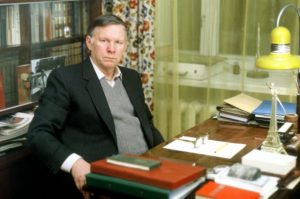 Since Lukashenka came to power, censorship has spread not only to the press but also to literature. After the first presidential elections in Belarus, the persecution of the writer Vasil Bykov began. He wrote about the war and Stalin repressions. In 1994, he was a confidant of the opposition candidate Zenon Poznyak. After Lukashenka became president, Vasil Bykov stopped being published. In 1995, the film based on his works was banned. In 1997, the communist newspaper “We and Time” published the material “Ordinary Judas”, where the journalist spoke very negatively about Vasil Bykov. Five fellow soldiers of the writer signed the letter “Inoculation of hostility”, printed in several republican newspapers. The text said: “Your military stories, Vasily Vladimirovich, remain with us, but we will not go to intelligence with Bykov, the politician.” As a result, at the end of his life, Vasil Bykov emigrated and returned to Belarus only before his death.
Since Lukashenka came to power, censorship has spread not only to the press but also to literature. After the first presidential elections in Belarus, the persecution of the writer Vasil Bykov began. He wrote about the war and Stalin repressions. In 1994, he was a confidant of the opposition candidate Zenon Poznyak. After Lukashenka became president, Vasil Bykov stopped being published. In 1995, the film based on his works was banned. In 1997, the communist newspaper “We and Time” published the material “Ordinary Judas”, where the journalist spoke very negatively about Vasil Bykov. Five fellow soldiers of the writer signed the letter “Inoculation of hostility”, printed in several republican newspapers. The text said: “Your military stories, Vasily Vladimirovich, remain with us, but we will not go to intelligence with Bykov, the politician.” As a result, at the end of his life, Vasil Bykov emigrated and returned to Belarus only before his death.
In 1997, the Writer’s House was taken away from the independent Union of Belarusian Writers by the decision of Lukashenka. Five years later, in 2002, literary and civic media published under the auspices of the Union were closed. The state newspaper “Literature and Art” appeared instead of them, and all the employees who were not loyal to the Lukashenka regime quit. In 2005, the Union of Belarusian Writers split into two parts. One of them became the Union of Writers of Belarus, which supports Lukashenko. It was headed by Nikolai Cherginets, a former security official, the head of the initiative group of Lukashenka in the 2001 elections. The remaining part of the Union of Belarusian Writers was published in opposition magazines: “Dzeyaslou”, “ARCHE” – published books in private publishing houses. Literature could be bought in opposition bookstores (“Knigarnya Ў”, “Lohvinau”), via the Internet and very rarely – in state shops.
In the 2010s, a new stage of the destruction of independent Belarusian literature began. In 2011, writers Olga Ipatova, Gennady Buravkin, Sergey Zakonnikov and Anatoly Vertinsky appeared on the black list of the Ministry of Culture. To popularize Belarusian classics, Brest activists placed excerpts from their novels on buses – however, in 2012, this project was banned, explaining that the policy of forced belarusification and artificial reduction of the Russian language was unacceptable.
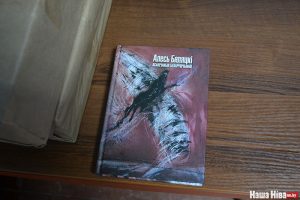 In 2014, the authorities banned the publication by Ales Bialiatski “Asvechanyya Belarushchynai”. Customs officers did not allow to import the book into Belarus, having found “harm to the state interests of the country” in the collection. At the same time, Valery Karbalevich’s book “Alexander Lukashenko. Political portrait” was detained by customs. In the same year, the opposition bookstore “Galiyafy” was closed. They not only sold books here but also held presentations, literary readings, performances and seminars. After five months, the bookstore was banned from trading and the rent was raised. During the most active period, up to 10 events were held in the room. Writers Algerd Baharevich, Adam Globus, Rygor Borodulin, Viktor Zhibul, Anatoly Kudlasevich and others presented their books here.
In 2014, the authorities banned the publication by Ales Bialiatski “Asvechanyya Belarushchynai”. Customs officers did not allow to import the book into Belarus, having found “harm to the state interests of the country” in the collection. At the same time, Valery Karbalevich’s book “Alexander Lukashenko. Political portrait” was detained by customs. In the same year, the opposition bookstore “Galiyafy” was closed. They not only sold books here but also held presentations, literary readings, performances and seminars. After five months, the bookstore was banned from trading and the rent was raised. During the most active period, up to 10 events were held in the room. Writers Algerd Baharevich, Adam Globus, Rygor Borodulin, Viktor Zhibul, Anatoly Kudlasevich and others presented their books here.
 In 2015, Belarus received the first winner of the Nobel Prize in Literature – Sviatlana Alexievich. But Lukashenka called her the worst son of Belarus: “They do not choose their homeland, their land, like their parents, their mother. She is what she is. And if you speak badly about the Motherland, you are ashamed of it – then you are a bad son.” Later, Lukashenka said about Sviatlana Alexievich as “Nobel Prize laureate who has not yet managed to receive it, have left the country and tried to pour a bucket of dirt on their country.”
In 2015, Belarus received the first winner of the Nobel Prize in Literature – Sviatlana Alexievich. But Lukashenka called her the worst son of Belarus: “They do not choose their homeland, their land, like their parents, their mother. She is what she is. And if you speak badly about the Motherland, you are ashamed of it – then you are a bad son.” Later, Lukashenka said about Sviatlana Alexievich as “Nobel Prize laureate who has not yet managed to receive it, have left the country and tried to pour a bucket of dirt on their country.”
After the 2020 elections, independent Belarusian literature became mostly emigrant. On September 1, 2020, the Union of Belarusian Writers spoke out against violence in the country. On October 21, 2020, the poet Dmitry Strotsev was detained. On November 6, 2020, after a performance in one of the Minsk courtyards, the young poet Pavel Gorbach received 15 days. In December 2020, Algerd Bakharevich left the country due to repression, the poet Nikolai Popeko was put under criminal prosecution in the “case of the round dance” in Brest. On December 28, 2020, children’s writer Vladimir Yagovdik was detained during feeding ducks on the river bank.
It was not enough for the state to punish writers – and Belarusians were banned from reading in the literal sense of the word. In January 2021, the security forces came to the publishers Gennady Vinyarsky and Andrey Yanushkevich. On February 26, 2021, pensioners reading books by Belarusian authors on the train were detained at the Minsk-Severny railway station. On July 19, 2021, the accounts of the Belarusian PEN Center were seized, and on July 22, it became known that the Ministry of Justice filed a lawsuit to liquidate the organization. On August 17, 2021, the Ministry of Justice filed a lawsuit on the liquidation of the Union of Belarusian Writers.
Guerrilla cinema
State Belarusfilm cinema studio has shot more than 60 tapes since 1991. But a good half is devoted to the war. Independent cinema in Belarus develops without money, high-quality equipment, star actors. But at the same time, independent directors become the stars of international film festivals. There are already many examples: Vlada Senkova with her teen drama “II”, Alexey Poluyan and “Lake of Joy”, Yulia Shatun and “Tomorrow”, Nikita Lavretsky. Perhaps the most famous tape of recent years is “Crystal” by Daria Zhuk. And the film “Debut” by Anastasia Miroshnichenko was even nominated for an Oscar from our country.
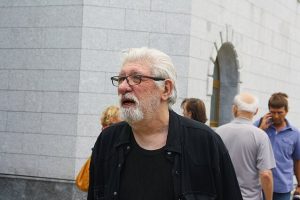 And yet, there is something to prohibit in the Belarusian cinema. In 2011, film director Yuri Khashchevatsky was blacklisted by the Ministry of Culture. He was a member of the United Civic Party. And in 2001, he was a member of the headquarters of the opposition candidate for the elections, Semyon Domash. In 2016, Yuri Khashchevatsky ran for deputy in the parliamentary elections, but lost to the candidate from the vertical of Lukashenka.
And yet, there is something to prohibit in the Belarusian cinema. In 2011, film director Yuri Khashchevatsky was blacklisted by the Ministry of Culture. He was a member of the United Civic Party. And in 2001, he was a member of the headquarters of the opposition candidate for the elections, Semyon Domash. In 2016, Yuri Khashchevatsky ran for deputy in the parliamentary elections, but lost to the candidate from the vertical of Lukashenka.
 At the same time, Andrey Kureychik, the director and screenwriter of many films, appeared on the list. He wrote scripts for the Russian films “Christmas Trees” and “Yulenka”, the comedy “Office romance. Our time”. His directorial movie “Higher than the Sky”, shot by the UN order in 2012, was banned from showing in Belarus until 2017. But other works, “Garash” and “Party-Zan Film”, were released in Belarusian cinemas.
At the same time, Andrey Kureychik, the director and screenwriter of many films, appeared on the list. He wrote scripts for the Russian films “Christmas Trees” and “Yulenka”, the comedy “Office romance. Our time”. His directorial movie “Higher than the Sky”, shot by the UN order in 2012, was banned from showing in Belarus until 2017. But other works, “Garash” and “Party-Zan Film”, were released in Belarusian cinemas.
Since 2020, Andrey Kureychik has joined the political agenda. He started a YouTube channel that gained more than 26 thousand subscribers. Also, he joined the Main structure of the Coordinating Council. In the autumn of 2021, after a warning from a lawyer about criminal prosecution in connection with political activities, Andrei Kureychik left for Europe and now lives in Helsinki.
 In 2021, the film “Courage” directed by Alexey Poluyan, was banned from showing in Belarus. The one-and-a-half-hour film uses footage taken at rehearsals and performances of actors of the Free Theater, at mass protests in late summer and early autumn of 2020 in Minsk, at the rally in memory of Alexander Taraykovsky, at the insulator on Akrestsin. References to the 1990s are also used. The film premiered at the Berlin International Film Festival.
In 2021, the film “Courage” directed by Alexey Poluyan, was banned from showing in Belarus. The one-and-a-half-hour film uses footage taken at rehearsals and performances of actors of the Free Theater, at mass protests in late summer and early autumn of 2020 in Minsk, at the rally in memory of Alexander Taraykovsky, at the insulator on Akrestsin. References to the 1990s are also used. The film premiered at the Berlin International Film Festival.
Artistic repression
 Representatives of modern Belarusian fine art are also subjected to repression, as are other cultural figures. In 1999, the artist Ales Pushkin implemented the performance “Manure for the president” and dumped a pile in front of the Lukashenka Administration building. After that, Ales Pushkin was involved in the restoration of architectural monuments, wall paintings, scenography. But at the same time, his exhibitions were often closed. Nevertheless, the artist continued to protest against Lukashenko and Putin – in 2019, Pushkin went to the Euroopt store in his hometown of Krupki with posters “Stop Russian aggression on Europe” and “Russia – war!”, as well as a portrait of Vladimir Putin. He was detained. For this action, Pushkin received a fine of 204 rubles.
Representatives of modern Belarusian fine art are also subjected to repression, as are other cultural figures. In 1999, the artist Ales Pushkin implemented the performance “Manure for the president” and dumped a pile in front of the Lukashenka Administration building. After that, Ales Pushkin was involved in the restoration of architectural monuments, wall paintings, scenography. But at the same time, his exhibitions were often closed. Nevertheless, the artist continued to protest against Lukashenko and Putin – in 2019, Pushkin went to the Euroopt store in his hometown of Krupki with posters “Stop Russian aggression on Europe” and “Russia – war!”, as well as a portrait of Vladimir Putin. He was detained. For this action, Pushkin received a fine of 204 rubles.
In 2011, artists Nikolai Kupava and Alexey Marochkin were blacklisted by the Ministry of Culture. In 1991, Nikolai Kupava and artists Yevgeny Kulik, Vladimir Krukovsky, Leon Bartlov, Lev Tolbuzin created a state emblem, “Pahonia”, and Belarusian flag. Alexey Marochkin refused the title of “Honored Artist of Belarus” in 1995 as a protest against the state’s control over art and against the policy of Lukashenka.
The main repressions against artists began after the 2020 elections. On August 22, 2020, fearing persecution for his protest activity, designer Vladimir Tsesler left the country. On October 30, 2020, the Y Gallery, where young contemporary artists exhibited, stopped working. The shareholders of the gallery were political prisoner Alexander Vasilevich and his wife, Nadezhda Zelenkova. On January 23, 2021, the artist Vladimir Gramovich was imprisoned. He was detained during a photo shoot on one of the Minsk streets. On March 24, 2021, the prosecutor’s office began checking the exhibition of Ales Pushkin in Grodno – and two days later, a criminal case was opened against the artist for inciting national hatred. In one of the paintings by Ales Pushkin, there was an anti-Soviet activist Avgen Zhikhar.
Belarusian culture is going through hard times now. It can be divided into two parts: the official one, permeated with the order, Soviet-style and love for the illegitimate government, and the protest one, where all the pain and hope of the Belarusian people are gathered. Our new culture is born in auto-zacks and courts, in colonies and pre-trial detention centres, in emigration and the underground – and we will be able to evaluate its layer only after the triumph. We do not doubt that the victory will give our culture a colossal boost for development.


